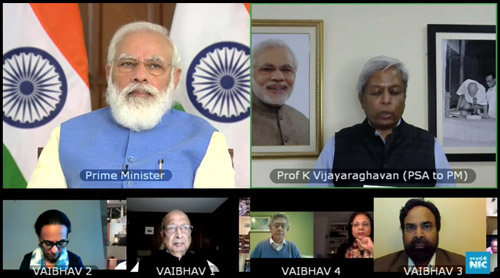 Hon’ble Prime Minister Shri Narendra Modi highlighted the importance of connecting and contributing to form a long-lasting association for empowering India and our planet while inaugurating the Vaishvik Bhartiya Vaigyanik (VAIBHAV) Summit, a global virtual summit of overseas and resident Indian Researchers and Academicians.
Hon’ble Prime Minister Shri Narendra Modi highlighted the importance of connecting and contributing to form a long-lasting association for empowering India and our planet while inaugurating the Vaishvik Bhartiya Vaigyanik (VAIBHAV) Summit, a global virtual summit of overseas and resident Indian Researchers and Academicians.
“VAIBHAV presents a great opportunity to connect and contribute; to realise the dream of building a secure and prosperous future for the coming generations. It will lead to useful collaborations in teaching and research. The efforts of the Indian diaspora will help create an ideal research ecosystem,” the Prime Minister said.
Calling VAIBHAV as a confluence of great minds, he said that merging tradition with modernity to create prosperity, these exchanges will certainly be useful and will also lead to useful collaborations in teaching and research.
“VAIBHAV Summit 2020 celebrates Science and Innovation from India and World and the Indian diaspora are the excellent ambassadors of India at the world stage,” he said.
Underlining India’s focus in science and technology, he said, “The need of the hour is to ensure more youngsters develop an interest in science. For that we must get well-versed with the science of history and history of science”, said Prime Minister Sh Narendra Modi.
He added that the Government of India has taken numerous measures to boost scientific research and innovation as science is at the core of its efforts towards socio-economic change and referred to India’s immense efforts towards development of vaccines and executing the vaccination programme.
Shri Narendra Modi highlighted the National Education Policy 2020, which was brought in after three decades and after nation-wide detailed consultations and deliberations. The policy aims to boost curiosity towards science and gives much-needed boost to Scientific Research. It provides an open and broad-based environment to nurture young talent.
Prime Minister (PM) mentioned about the pioneering space reforms of India, which will create opportunities for industry and academia.
Mentioning about Indian partnership in Laser Interferometer Gravitational-wave Observatory, CERN, and International Thermonuclear Experimental Reactor (ITER), he highlighted the importance of scientific research and development efforts at a global level.
The Prime Minister also referred to India’s major missions on supercomputing and cyber-physical systems and mentioned about the 25 innovation technological hubs already launched in India and how these would boost the startup ecosystem.
Talking about fundamental research and applications in areas of artificial intelligence, robotics, sensors, and big data analysis, he said that this will enhance the startup sectors and manufacturing in India.
Renowned academia and researchers from across the world participated in the Vaibhav Summit and shared their suggestions and ideas to pave the way for the country’s advancement in academics and scientific research.
Eminent Indian scientific diaspora and shared their ideas about the way forward in areas like basic research, fundamental research, health, higher education, advanced manufacturing, climate change, new-age technologies, infrastructure, & so on.
They suggested that international collaboration in various modes is the need of the hour in terms of joint degree programmes, research & development, manufacturing, infrastructure, and innovation. They advocated for knowledge sharing to solve real-world problems for the wellbeing of society, policy boost for building trust, and strengthening of the STI ecosystem in India through collaborations with academia & industry in India and as well as with their counterparts in other parts of the world. Experts also spoke about collaborations that spanned multidisciplinary areas like the use of intellectual property from mega-science projects for use in the treatment of diseases.
More than 3000 overseas Indian origin academicians and scientists from 55 countries and about 10,000 from India are taking part in the VAIBHAV summit, which is being organized by 200 Indian academic institutes and S&T departments, led by Principal Scientific Advisor, Government of India. Around 700 overseas panelists from 40 countries and 629 resident panelists from eminent Indian academia and S&T departments will deliberate on 18 different verticals with 80 sub-topics in 213 sessions.
The deliberations will be held from 3rd October to 25th October 2020, with consolidation of outcomes on 28th October. The summit will conclude on Sardar Vallabh Bhai Patel Jayanti. 31st October 2020. The summit involves multiple levels of interactions among the overseas experts and Indian counterparts over a month-long series of webinars and video conferences.
The broad S&T areas that will be discussed during the summit include computational sciences, electronics & communication, quantum technologies, photonics, aerospace technologies, medical sciences, biotechnology, agriculture, material & processing technologies, advanced manufacturing, earth sciences, energy, environmental sciences, and management.
The aim of the summit is to bring out a comprehensive roadmap leveraging the expertise and knowledge of global Indian researchers for addressing emerging challenges for universal development. The summit will reflect on the collaboration and cooperation instruments with academia and scientists in India and abroad. The goal is to create an ecosystem of knowledge and innovation in the country through global outreach.
Principal Scientific Advisor Prof K. Vijayaraghavan and 16 overseas panelists from different countries viz. USA, Japan, Australia, UK, France, Singapore, Republic of Korea, Brazil, and Switzerland, working in different domains such as computing & communication, high energy physics, manufacturing technologies, management, geo-science, climate changes, microbiology, IT security, nano-materials, smart villages, and mathematical sciences interacted with the Prime Minister during the inaugural session.






























